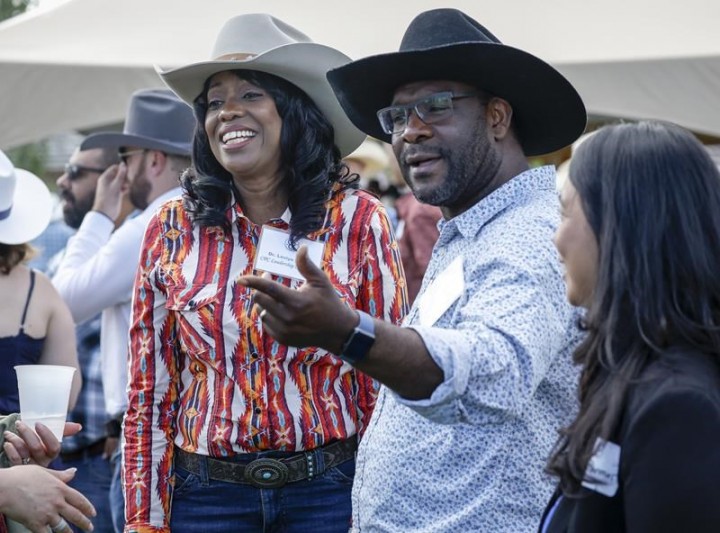OTTAWA — As a highly educated immigrant Black woman with degrees in gender studies, the environment and international law, Conservative leadership hopeful Leslyn Lewis says there is a “left-leaning narrative” about what she should think and how she should behave.
Her background, which includes a niche practice representing refugees persecuted for their sexual orientation and helping companies build renewable energy projects in developing countries, is so aligned with common perceptions of a “culture warrior” that Jordan Peterson called her on it in a recent interview.
“Are you sure you’re not a closet leftist operative?” he asked in a sprawling three-hour chat on his podcast.
She shrugged it off.
In the same interview, Peterson asked Lewis, who insists there is a global government conspiracy trying to overtake sovereign nations and vaccine passports could be used to track your personal buying habits, why she shouldn’t be dismissed as a socially conservative conspiracy theorist.
“I’m a very educated person and I do not care if somebody labels me a conspiracy theorist because it just means that they’re not intelligent enough to argue with me,” Lewis said.
The stance represents a departure from her days at Toronto’s York University, when she felt she had to keep her political views to herself while studying for her PhD in international law with a focus on green energy. Lewis said she felt like an undercover agent, hiding her political beliefs.
“I couldn’t really necessarily reveal that I was conservative,” Lewis told Peterson.
She lamented what she saw as a lack of diversity of thought as she worked on her thesis on how to use green tech to improve energy security in developing countries.
“That’s what the end of my university career was like, and that’s really unfortunate.”
Lewis went from complete political obscurity to Conservative party stardom in 2020 when she burst onto the national stage in the last leadership race. She placed third in that contest did better than some pundits had expected, including in some rural prairie ridings.
She attracted Conservative voters with her unabashed stance against sex-selective and coerced abortion.
Before becoming an MP in 2021, the leadership candidate used her law degree to help Canadian companies offer green solutions like solar power to wean people in developing nations off fossil fuels.
“We had women who were suffering from pulmonary lung disorders because of the amount of fossil fuels that they had to burn in order to do basic things like cooking,” said Lewis, who recalled that project during an interview with The Canadian Press.
Involving environmental work in her practice was an ambition, she said — something she aspired to while working in more lucrative fields of law like immigration.
Her doctoral thesis was also an ode to the untapped potential of renewable energy in the developing world, beginning with a view of global energy consumption from the heavens.
“While North America and Europe appear to be illuminated by flickers of light resembling one harmonious radiant bulb, the continent of Africa has few glimmers,” she wrote in her 2019 thesis.
Her academic fervour for renewables and professional interest in green tech has earned her some suspicion among some Conservatives with an interest in the continued development of Canada’s oil and gas sector.
“With her PhD in hand, it is unlikely that any candidate in Canadian history has been more intellectually prepared to dish out massive subsidies to the green lobby,” charged Dan McTeague, the president of Canadians for Affordable Energy, in a blog post about Lewis’s environmental platform in the last leadership race.
Lewis is quick to challenge that skepticism, suggesting in an interview with the conservative-leaning True North news outlet that people with such view do not understand her thesis.
She said she wanted to help people in developing countries cultivate their greatest natural resource in an environmentally friendly way, which is exactly what she wants for Canada.
In her view, resource development and environmental stewardship are not mutually exclusive, and the climate change debate is ruled by fear and polarized by politics.
“I believe that the environment is a non-partisan issue, and that it should not be politicized,” Lewis told The Canadian Press.
A Lewis-run government would incentivize green energy while recognizing that Canada still needs fossil fuels to function, she said.
Lewis has indicated she would toss the more ambitious greenhouse gas emissions targets set last year by the Liberals in favour of potentially reverting back to those established by former prime minister Stephen Harper in 2015.
And even that, Lewis said, should only be done if it doesn’t infringe on Canada’s independence.
“Any international agreement that I believe meets the needs of our sovereign nation and meets our objectives I don’t have a problem with,” Lewis said.
Lewis is deeply suspicious of global entities like the United Nations, the World Economic Forum and the World Health Organization, which she insists on her website are trying to “transform our way of life.”
“We have a lot of international organizations encroaching on our freedoms and on our liberties and somebody with international experience that can dissect these treaties and understand how these treaties affect our sovereignty is very, very important,” Lewis told Peterson.
She added she believes the government has socially conditioned people to avoid eating beef because of the greenhouse gas emissions coming from cattle ranches.
“They’ve been programming us to want to eat bugs and to not want to eat, especially beef,” Lewis said. She expounded in a blog post that the government has demonized and put undue pressure on livestock farming while a cricket-processing facility has opened in London, Ont.
She is referring to a new plant which intends to produce protein from crickets to sell mainly to pet food makers.
Lewis also explained her concerns about the World Economic Forum’s environmental, social governance program that incentivizes investment in business with smaller carbon footprints.
“The carbon footprint is almost going to replace what we know as our dollar,” Lewis said. “Our entire lives are going to be equated on how much carbon footprint we contribute to society or how good we are at reducing our carbon footprint.”
At the end of the day, Lewis said she really doesn’t care what people call her.
“There’s no shame, you can call me anything you want. I’m going to continue to speak,” she said.
“I’m going to continue to get my message out there and I’m going to continue to send Canadians information and substantiate what I say with information, so Canadians can be informed about what their government is planning for them.”
This report by The Canadian Press was first published Sept. 3, 2022.
Laura Osman, The Canadian Press
Related


































